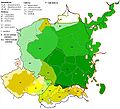 | The Polabian language, also known as Drevanian–Polabian language, Drevanian language, and Lüneburg Wendish language, is a West Slavic language that was... 20 KB (978 words) - 10:10, 13 April 2024 |
up Polabian in Wiktionary, the free dictionary. Polabian may refer to: Polabian language, an extinct Slavic language spoken by Polabians Polabians, an... 220 bytes (65 words) - 18:56, 24 February 2023 |
 | study also did not cover the so-called Old Novgordian dialect, the Polabian language and some other Slavic lects. The above Kassian-Dybo's research did... 72 KB (7,062 words) - 10:02, 7 April 2024 |
 | Obotrites (category Articles containing Latin-language text) speaking Slavic dialects (Polabian language), although subsequently their language was displaced by German. The Polabian language survived until the beginning... 12 KB (753 words) - 22:37, 14 March 2024 |
 | the various daughter languages. The main exception are the Northern Lechitic languages (Kashubian, extinct Slovincian and Polabian) only with lengthening... 74 KB (7,528 words) - 22:41, 6 April 2024 |
 | West Slavs (category CS1 Polish-language sources (pl)) subgroups: Lechitic, including Polish, Kashubian, and the extinct Polabian and Pomeranian languages; Sorbian in the region of Lusatia; and Czecho–Slovak in the... 17 KB (1,512 words) - 20:37, 24 January 2024 |
 | Berlin (category Articles containing Polabian-language text) Wendisch. The name Berlin has its roots in the language of the West Slavs, and may be related to the Old Polabian stem berl-/birl- ("swamp"). Of Berlin's twelve... 234 KB (19,436 words) - 15:27, 22 April 2024 |
last remnants of the Polabians, including the Polabian language, died out in the 18th century. Cultural remnants of the Polabians of Lower Saxony include... 1 KB (124 words) - 17:14, 2 July 2023 |
 | Wends (redirect from Wends language) the Baltic Sea (Vendland), and the term was therefore used to refer to Polabian Slavs like the Obotrites, Rugian Slavs, Veleti/Lutici, and Pomeranian tribes... 20 KB (2,337 words) - 18:46, 17 April 2024 |
 | East Slavic, developed into modern East Slavic languages Old Ruthenian Polabian language Pomeranian language, only Kashubian remains as a living dialect... 3 KB (211 words) - 20:06, 9 February 2024 |
Slavs (category CS1 Ukrainian-language sources (uk)) Adam of Bremen in Gesta Hammaburgensis ecclesiae pontificum. The Polabian language survived until the beginning of the 19th century in what is now the... 98 KB (8,444 words) - 23:20, 21 April 2024 |
 | Laboe (category CS1 German-language sources (de)) is based on its name, as Laboe means "swan" in the extinct Slavic Polabian language. "Bevölkerung der Gemeinden in Schleswig-Holstein 4. Quartal 2022"... 2 KB (103 words) - 20:20, 23 March 2024 |
Sometimes it is considered a dialect of Polish; Polabian, extinct since the mid-18th century, a West Lechitic language formerly spoken by Slavic peoples in areas... 8 KB (614 words) - 03:41, 30 March 2024 |
from Low German and the extinct Polabian (West Slavic) and Old Prussian (West Baltic) languages. The Kashubian language exists in two different forms:... 45 KB (4,298 words) - 14:24, 17 April 2024 |
 | Brandenburg an der Havel (category Articles containing Polabian-language text) an der Havel (German pronunciation: [ˈbʁandn̩bʊʁk ʔan deːɐ̯ ˈhaːfl̩] ; Polabian: Brenna) is a town in Brandenburg, Germany, which served as the capital... 16 KB (1,778 words) - 09:08, 9 April 2024 |
West Lechitic dialects (redirect from West Lechitic languages) Rani subdialects Veleti dialect Obotrite dialect Drevani dialect – Polabian language Marcho-Magdeburgian dialect Dajna 1993, p. 69. Konopka 2008, p. 657... 6 KB (552 words) - 05:16, 30 March 2024 |
 | Lüneburg (category Articles containing Polabian-language text) Luneburgum or Lunaburgum; Old High German: Luneburc; Old Saxon: Hliuni; Polabian: Glain), officially the Hanseatic City of Lüneburg (German: Hansestadt... 54 KB (6,253 words) - 04:59, 21 April 2024 |
 | Gartz (category Articles containing Polabian-language text) Christianization of Western Pomerania. The name of the town derives from Old-Polabian from the word *gardec < *gordьcь, meaning "small fortified settlement"... 7 KB (688 words) - 05:43, 3 February 2024 |
 | Uelzen (category Articles containing Polabian-language text) Hundertwasser Station, Uelzen, and remains a popular tourism destination. The Polabian name for Uelzen is Wilcaus (spelled Wiltzaus in older German reference... 15 KB (1,515 words) - 20:21, 27 February 2024 |
 | Culture of Poland (category Articles containing Polish-language text) the extinct Polabian language. All these languages except Polish are sometimes classified as a Pomeranian subgroup. The West Slavic Languages are a subfamily... 35 KB (3,678 words) - 01:55, 10 March 2024 |
 | existed only as a spoken language. The closest relatives of Polish are the Elbe and Baltic Sea Lechitic dialects (Polabian and Pomeranian varieties)... 89 KB (8,200 words) - 07:51, 19 April 2024 |
 | Lüchow (category CS1 German-language sources (de)) Salzwedel, Lüchow is located on the German Framework Road. In the Polabian language, Lüchow is called Ljauchüw (Lgauchi or Lieuschü in older German reference... 9 KB (599 words) - 19:04, 14 November 2023 |
 | Modern Polish language. Other linguists relate the Pomeranian language to the Polabian group of dialects (forming the Pomeranian-Polabian group). After... 12 KB (1,387 words) - 12:00, 5 February 2024 |
 | the River Oder, an area later entitled Germania Slavica, settled by the Polabian Slav tribes in the north and by others, such as the Sorbs and the Milceni... 19 KB (1,476 words) - 03:06, 9 April 2024 |
 | Lüchow-Dannenberg (category CS1 German-language sources (de)) till the 18th century — the last known user of the local dialect of Polabian language died in 1752. The landscape is characterised by riverside woodlands... 6 KB (549 words) - 00:52, 31 March 2024 |





